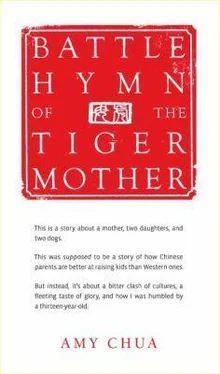For example, if a child comes home with an A-minus on a test, a Western parent will most likely praise the child. The Chinese mother will gasp in horror and ask what went wrong. If the child comes home with a B on the test, some Western parents will still praise the child. Other Western parents will sit their child down and express disapproval, but they will be careful not to make their child feel inadequate or insecure, and they will not call their child “stupid,” “worthless,” or “a disgrace.” Privately, the Western parents may worry that their child does not test well or have aptitude in the subject or that there is something wrong with the curriculum and possibly the whole school. If the child’s grades do not improve, they may eventually schedule a meeting with the school principal to challenge the way the subject is being taught or to call into question the teacher’s credentials.
If a Chinese child gets a B — which would never happen — there would first be a screaming, hair-tearing explosion. The devastated Chinese mother would then get dozens, maybe hundreds of practice tests and work through them with her child for as long as it takes to get the grade up to an A. Chinese parents demand perfect grades because they believe that their child can get them. If their child doesn’t get them, the Chinese parent assumes it’s because the child didn’t work hard enough. That’s why the solution to substandard performance is always to excoriate, punish, and shame the child. The Chinese parent believes that their child will be strong enough to take the shaming and to improve from it. (And when Chinese kids do excel, there is plenty of ego-inflating parental praise lavished in the privacy of the home.)
Second, Chinese parents believe that their kids owe them everything. The reason for this is a little unclear, but it’s probably a combination of Confucian filial piety and the fact that the parents have sacrificed and done so much for their children. (And it’s true that Chinese mothers get in the trenches, putting in long grueling hours personally tutoring, training, interrogating, and spying on their kids.) Anyway, the understanding is that Chinese children must spend their lives repaying their parents by obeying them and making them proud. By contrast, I don’t think most Westerners have the same view of children being permanently indebted to their parents. Jed actually has the opposite view. “Children don’t choose their parents,” he once said to me. “They don’t even choose to be born. It’s parents who foist life on their kids, so it’s the parents’ responsibility to provide for them. Kids don’t owe their parents anything. Their duty will be to their own kids.” This strikes me as a terrible deal for the Western parent.
Third, Chinese parents believe that they know what is best for their children and therefore override all of their children’s own desires and preferences. That’s why Chinese daughters can’t have boyfriends in high school and why Chinese kids can’t go to sleep-away camp. It’s also why no Chinese kid would ever dare say to their mother, “I got a part in the school play! I’m Villager Number Six. I’ll have to stay after school for rehearsal every day from 3:00 to 7:00, and I’ll also need a ride on weekends.” God help any Chinese kid who tried that one.
Don’t get me wrong: It’s not that Chinese parents don’t care about their children. Just the opposite. They would give up anything for their children. It’s just an entirely different parenting model. I think of it as Chinese, but I know a lot of non-Chinese parents — usually from Korea, India, or Pakistan — who have a very similar mind-set, so it may be an immigrant thing. Or maybe it’s the combination of being an immigrant and being from certain cultures.
Jed was raised on a very different model. Neither of his parents were immigrants. Both Sy and Florence were born and raised near Scranton, Pennsylvania, in strict Orthodox Jewish households. Both lost their mothers at a young age, and both had oppressive, unhappy childhoods. After they were married, they got out of Pennsylvania as fast as they could, eventually settling in Washington, D.C., where Jed and his older brother and sister grew up. As parents, Sy and Florence were determined to give their children the space and freedom they had been deprived of as children. They believed in individual choice and valued independence, creativity, and questioning authority.
There was a world of difference between my parents and Jed’s. Jed’s parents gave him a choice about whether he wanted to take violin lessons (which he declined and now regrets) and thought of him as a human being with views. My parents didn’t give me any choices, and never asked for my opinion on anything. Every year, Jed’s parents let him spend the entire summer having fun with his brother and sister at an idyllic place called Crystal Lake; Jed says those were some of the best times of his life, and we try to bring Sophia and Lulu to Crystal Lake when we can. By contrast, I had to take computer programming — I hated summers. (So did Katrin, my seven-years-younger sister and soul mate, who on top of computer programming read grammar books and taught herself sentence diagramming to pass the time.) Jed’s parents had good taste and collected art. My parents didn’t. Jed’s parents paid for some but not all of his education. My parents always paid for everything, but fully expect to be cared for and treated with respect and devotion when they get old. Jed’s parents never had such expectations.
Jed’s parents often vacationed without their kids. They traveled with friends to dangerous places like Guatemala (where they were almost kidnapped), Zimbabwe (where they went on safari), and Borobudur, Indonesia (where they heard the gamelan). My parents never went on vacation without their four kids, which meant we had to stay in some really cheap motels. Also, having grown up in the developing world, my parents wouldn’t have gone to Guatemala, Zimbabwe, or Borobudur if someone paid them; they took us to Europe instead, which has governments.
Although Jed and I didn’t explicitly negotiate the issue, we basically ended up adopting the Chinese parenting model in our household. There were several reasons for this. First, like many mothers, I did most of the parenting, so it made sense that my parenting style prevailed. Even though Jed and I had the same job and I was just as busy as he was at Yale, I was the one who oversaw the girls’ homework, Mandarin lessons, and all their piano and violin practicing. Second, totally apart from my views, Jed favored strict parenting. He used to complain about households where the parents never said no to their children — or, worse, said no but then didn’t enforce it. But while Jed was good at saying no to the girls, he didn’t have an affirmative plan for them. He would never have forced things like piano or violin on them if they refused. He wasn’t absolutely confident that he could make the right choices for them. That’s where I came in.
But probably most important, we stuck with the Chinese model because the early results were hard to quarrel with. Other parents were constantly asking us what our secret was. Sophia and Lulu were model children. In public, they were polite, interesting, helpful, and well spoken. They were A students, and Sophia was two years ahead of her classmates in math.They were fluent in Mandarin. And everyone marveled at their classical music playing. In short, they were just like Chinese kids.
Except not quite. We took our first trip to China with the girls in 1999. Sophia and Lulu both have brown hair, brown eyes, and Asianesque features; they both speak Chinese. Sophia eats all kinds of organs and organisms — duck webs, pig ears, sea slugs — another critical aspect of Chinese identity. Yet everywhere we went in China, including cosmopolitan Shanghai, my daughters drew curious local crowds, who stared, giggled, and pointed at the “two little foreigners who speak Chinese.” At the Chengdu Panda Breeding Center in Sichuan, while we were taking pictures of newborn giant pandas — pink, squirming, larvalike creatures that rarely survive — the Chinese tourists were taking pictures of Sophia and Lulu.
Читать дальше












